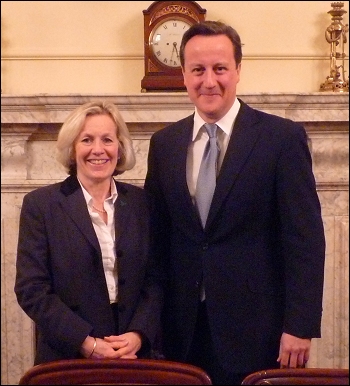Burnham-On-Sea’s MP met the Prime Minister David Cameron on Monday (January 16th) to raise awareness of some of the challenges faced by residents in the area – including public transport.
Tessa Munt met with David Cameron in Number 10 Downing Street, as pictured, where she asked him to consider what the government might do to address concerns in Somerset.
One particular focus was on poor rural public transport, which Tessa said is crucial for both young and old in providing a lifeline for those without the use of a car to reach centres with shops, libraries, pubs, post offices, leisure centres and other support services.
She told Burnham-On-Sea.com: “The lack of affordable public transport in the countryside could ultimately threaten the ability of villages and our smaller towns to survive, and therefore cannot be ignored.”
“I’ve always thought that as well as taxpayers funding our senior citizens’ bus passes, we should do the same for those who are 18 and younger. That seems only fair – particularly as from 2013 and 2015, young people will have to stay in education or educational training.”
“Whilst in David Cameron’s office, I asked the Prime Minister to remember that the priority of the members of the Youth Parliament for 2012 was affordable and accessible public transport – which they debated and voted upon in our Chamber in the House of Commons in October 2011.”
The other concerns raised included the high cost of housing and the lack of affordable homes, the difficulties in getting full-time, longer-term employment rather than part-time and seasonal jobs, and the problems of getting a choice in healthcare and education.
She also quizzed him on the “unfair formula for funding rural local authorities” whereby rural residents pay Council Tax which is on average £100 more than those living in cities, but often have to travel many miles to access the very services for which they pay through their taxes.
Tessa said: ”The Prime Minister is aware of the inequity of funding formulae and seemed open to the possibility of reviewing this to reflect the sparsity, hidden deprivation and extra expense that comes from living in rural areas. I look forward to seeing what is proposed to make the system fairer for those of us who live in the countryside.”







